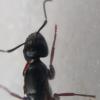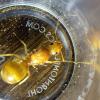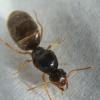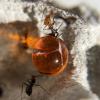- Formiculture.com
- Forums
- Gallery
- Members
- Member Map
- Chat

Queen ant founding stage
Started By
johndoe224
, Apr 23 2021 12:30 PM
8 replies to this topic
#1
 Offline
-
Posted April 23 2021 - 12:30 PM
Offline
-
Posted April 23 2021 - 12:30 PM
I have two Pheidole Dentata queens that i’ve had since march 1st. They had eggs when I received them but its been 7 weeks and none have hatched yet; I'm concerned that the queens will die before the ants reach adult stage; one is in the pupae stage.
#2
 Offline
-
Posted April 23 2021 - 12:33 PM
Offline
-
Posted April 23 2021 - 12:33 PM
I have two Pheidole Dentata queens that i’ve had since march 1st. They had eggs when I received them but its been 7 weeks and none have hatched yet; I'm concerned that the queens will die before the ants reach adult stage; one is in the pupae stage.
you could go out to a wild colony and colect pupae
1X Pogonomyrmex occidentalis 40-50 Workers
1X Solenopsis molesta 10 Workers (mono)
Ants I Want: Crematogaster sp, Camponotus Sp., Ponera Pennsylvanica, Mymercocystus sp.
My Youtube channel: https://www.youtube....kUjx-dPFMyVqOLw
Join Our Fledgling Discord Server https://discord.com/...089056687423489
#3
 Offline
-
Posted April 23 2021 - 1:00 PM
Offline
-
Posted April 23 2021 - 1:00 PM
you have nothing to worry about as the have been producing and if you want to give them some sugar water. Also when do you check on them. Like how often.
Currently: Considering moving to Australia
Reason: Myrmecia
Reason: Myrmecia
#4
 Offline
-
Posted April 23 2021 - 3:29 PM
Offline
-
Posted April 23 2021 - 3:29 PM
What temperature are you keeping them? In my experience, eggs that never hatch are laid by unmated queens.
- Antkeeper01 likes this
"The ants are a people not strong, yet they prepare their meat in the summer." Prov. 30:25
Keep ordinary ants in extraordinary ways.
Keep ordinary ants in extraordinary ways.
#5
 Offline
-
Posted April 23 2021 - 6:07 PM
Offline
-
Posted April 23 2021 - 6:07 PM
7 weeks is very long for a supposedly very fast growing species. She may well be infertile/unmated.
Hi there! I went on a 6 month or so hiatus, in part due, and in part cause of the death of my colonies.
However, I went back to the Sierras, and restarted my collection, which is now as follows:
Aphaenogaster uinta, Camponotus vicinus, Camponotus modoc, Formica cf. aserva, Formica cf. micropthalma, Formica cf. manni, Formica subpolita, Formica cf. subaenescens, Lasius americanus, Manica invidia, Pogonomyrmex salinus, Pogonomyrmex sp. 1, Solenopsis validiuscula, & Solenopsis sp. 3 (new Sierra variant).
#6
 Offline
-
Posted April 23 2021 - 6:25 PM
Offline
-
Posted April 23 2021 - 6:25 PM
you have nothing to worry about as the have been producing and if you want to give them some sugar water. Also when do you check on them. Like how often.
if they are infertile they can still produce eggs
- ZTYguy likes this
#7
 Offline
-
Posted April 23 2021 - 7:49 PM
Offline
-
Posted April 23 2021 - 7:49 PM
I keep them at 85 degrees fahrenheit; the eggs are growing just some slower than others.
What temperature are you keeping them? In my experience, eggs that never hatch are laid by unmated queens.
#8
 Offline
-
Posted April 23 2021 - 7:51 PM
Offline
-
Posted April 23 2021 - 7:51 PM
you have nothing to worry about as the have been producing and if you want to give them some sugar water. Also when do you check on them. Like how often.
if they are infertile they can still produce eggs
Yeah, I meant to say it in a different way, sorry for any confusion.
Currently: Considering moving to Australia
Reason: Myrmecia
Reason: Myrmecia
#9
 Offline
-
Posted April 24 2021 - 5:22 AM
Offline
-
Posted April 24 2021 - 5:22 AM
If they are at 85 with no change I would guess they are not fertile.I keep them at 85 degrees fahrenheit; the eggs are growing just some slower than others.
What temperature are you keeping them? In my experience, eggs that never hatch are laid by unmated queens.
1 user(s) are reading this topic
0 members, 1 guests, 0 anonymous users




















